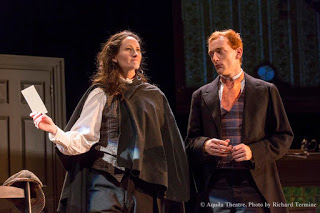Just as a certain wildly popular celebrity departed from New York to commence production on a certain wildly popular television show based on a certain wildly popular, old-timey-but-updated sleuth, another iteration made its way back to the city. Over at the Queens Theatre, Aquila Theatre Company presented an adaptation of Sir Arthur Conan Doyle’s classic stories of The Adventures of Sherlock Holmes. Aquila, the Professional company-in-residence at New York University’s Center for Ancient Studies, is another in a recent line of companies at the theatre whose mission is to provide the public with accessible interpretations of classic works.
(The other one being the theater’s own company-in-residence, TITAN Theatre Company, the most recent production of which I reviewed here.)
As stated above, everyone’s favorite snarky sociopath has seen many a proliferation find its way into the pop culture canon over the years, namely: Guy Ritchie’s films with Robert Downey, Jr.; CBS’ Elementary; and the BBC/Masterpiece hit co-production Sherlock. Books such as The Sherlock Holmes Book: Big Ideas Simply Explained and Mastermind: How to Think Like Sherlock Holmes — along with Conan Doyle’s original collection of works, of course — have lined bookstore shelves, further heightening the Holmesian craze. If one were to actually apply these books’ methods, one would probably, and very logically, conclude that it would be only a matter of time until a stage adaptation crept upon us.
In which case, that would be correct.
However, unlike that wildly popular celebrity (y’know, the one whose name sounds a bit like Beryllium Cucumber), the Sherlock of Desiree Sanchez’s imagining is much less the tall, cherub-faced specimen of a man we’ve come to know and love onscreen, and instead takes his form in that of a tall, lithe-limbed…woman onstage.
Yes, that’s right, Sherlock Holmes is a female — at least for our purposes here.
Admittedly, it was this exact promise of a “female Sherlock” which led this writer to this particular production in the first place; not only because the prospect of a woman grasping the chance at playing such a character was too interesting and “hmm”-worthy to pass up, but also because the idea of girls in cloaks kicking ass arse was always a personal point-of-interest. This Sherlock’s female-ness is certainly mentioned within the dialogue of the play, but done so in an almost flippant manner, as if seeing a woman don trousers (along with signature cape and deerstalker hat) in Victorian England instead of a corset and skirts were a natural occurence. It would seem that this unusual piece of casting was not a device to highlight any political undertones in the text, as with the case of TITAN’s Othello last year; nor was it a way to subvert expectations, just as The Queen’s Company’s production of Sir Patient Fancy did two years ago..
This is not to say that Jackie Schram, the actress embodying the role, did not succeed in exceeding those expectations. On the contrary, Ms. Schram brings into her Sherlock one that is just as quick-witted, observant and resourceful as the original canon’s, managing all the while to inject some physical humor along the way. In fact, physicality played a major role in providing much of the levity in the play — aided most wonderfully by Ms. Schram’s delightful Watson to her Holmes, Peter Groom, who does everything from clacking away frantically at a typewriter to scuttering frightfully away from a creaking door. The rest of the cast is rounded out with Kirsten Foster, Michael Rivers and Hemi Yeroham, all of whom gamely join in on the fun, as well; most notably, in a scene from Sherlock’s first case (‘The Adventure of the Copper Beeches’), wherein they are chased by a bloodthirsty dog — albeit, an invisible one.
The play, much like its characters in ‘Copper Beeches,’ fumbles along at first, trying to find its footing, tonally. Many of the jokes only manage to garner a few laughs in many of the early scenes, but eventually hits its stride by the second case, ‘The Adventure of the Yellow Face,’ the conclusion of which is not revealed until the beginning of the play’s second act, providing some fun tension. By the time we delve into one of the most famous of Holmesian cases, ‘A Scandal in Bohemia,’ the entire theatre attention is held rapt, as our female Sherlock comes face-to-face with Irene Adler, later dubbed by the detective as “The Woman.” Again, despite many possibilities for an interesting, modern interpretation of this case (i.e., homo-erotic overtones), ‘Scandal’ was played rather straightforwardly, and disappointingly so. Still, the ensemble’s strong and energetic performance more than made up for these missed opportunities, making for an enjoyable evening in the theater.
Images courtesy of Richard Termine. The Adventures of Sherlock Holmes ran from April 1-23, 2016 at The Queens Theatre (14 United Nations Avenue) and the GK ArtsCenter (29 Jay Street).


